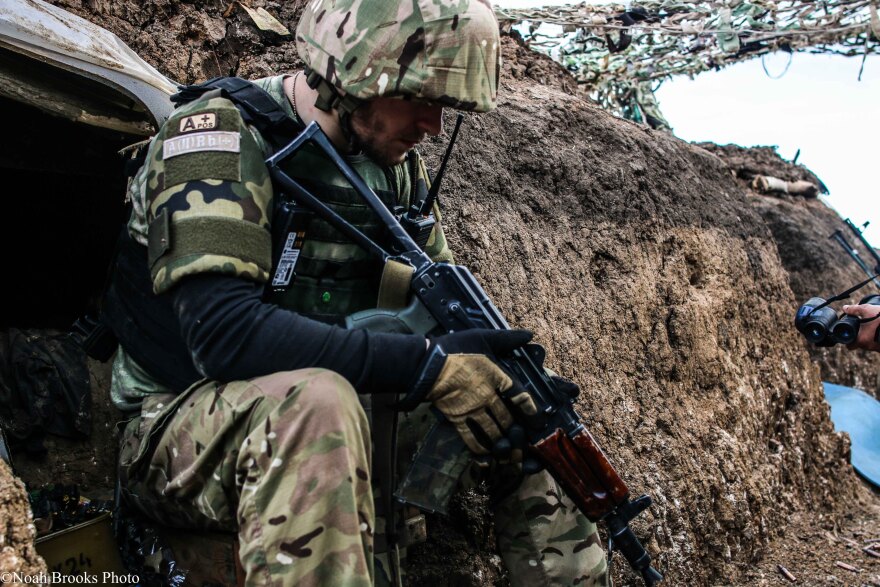This is Mike Strong, in Hays, for HPPR. The book is “Words for War,” an anthology of Ukrainian poets edited by Oksana Maksymchuk and Max Rosochinsky.
I used to write a lot of poetry. I haven’t in a long time, but I retain, somewhere, in boxes stored away, volumes of material. At some point I lost patience for poetry as I looked for data. Prose and poetry are two different experiences.
Prose enumerates the world’s issues and causes. Poetry performs, on stage, in your head, the results of those issues and causes. Prose talks about feelings. Poetry records feelings and seeks to pass them to the listener.
“Words for War” came out in 2017. It mostly concerns the invasion and taking of land by Russia in 2014, an invasion which barely registered in the US, yet it seems even more current for today’s phase of this war.
Editors Oksana Maksymchuk and Max Rosochinsky tell us, “It is never safe to assume identity between the “I” of the poem and the “I” of the poet. Poets often find that they don’t just speak as themselves; sometimes they can’t even recognize the voices they speak in.” (p.16)
For these poets this is more than witnessing, and conveying the experience of their senses, this anthology of Ukrainian poetry is an act of identity. A confirmation that they are distinctly Ukrainian. A determination to exist, despite invasion.
From the book, excerpts from poet Boris Humenyuk, one of the combat soldiers from 2014, who writes:
Our platoon commander is a strange man … today he outdid himself In the early morning, he entered our tent and said That’s it! No more war today! That’s what they announced on TV — War is done for three whole days. … On the first day of no war We lost our machine gun loader Sashko from Boyarka And grenadier Max from Luhansk The bullets came from the other side of war Like angry hornets Stung Sashko in the neck And Max in the heart Maybe the other side doesn’t have a strange platoon commander Bringing weird news
Maybe they watch a different TV channel Maybe their TV set is broken.
And in “A Testament” Humenyuk writes: (excerpts)
We don’t need eulogies In the silence that follows battle.
They always seem odd — Like punching a dead soldier Then ordering him to his feet.
We don’t need funerals We know where our place is Simply cover us with earth And move on (pp 65-66)
This is a book where you might want to skim the Glossary and stop to detail some of the entries. It fills in a lot of connecting information. Also read the end notes on geographical locations and places of significance and do a little map reading.
Poet Kateryna Kalytko – excerpted – she says
. . . Five times they take you out of the barracks to a ditch where forty-three lay rotting and each time you think: I will finally die and tell God that it was a lame joke.
But they throw you face down into the dirt and take their sweet time pressing a gun to your head. Since then, he says, I don’t like to dream, these kinds of memories, they aren’t fitting for a man.
… what do you say to that I just keep wiping the dirt off his face, over and over again, …
This is Mike Strong, in Hays, for HPPR Radio Readers Book Club.










